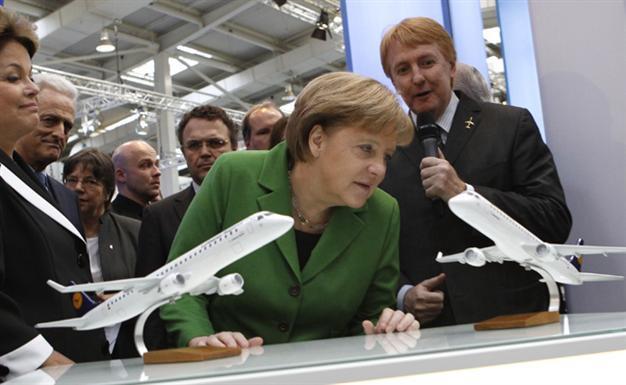Plane makers take Embraer on board in joint bid for cheap oil

German Chancellor Merkel (C) and Brazil’s President Rousseff (L) look at Embraer aerospace aircraft models during visit to CeBIT fair in Hanover earlier this month. REUTERS photo
Along with Europe’s Airbus and and U.S. Boeing, Embraer of Brazil announced on March 22 a joint plan to develop affordable biofuels for the airplane industry.The consensus was surprising for the industry as it both brought arch rivals together and praised Embraer, the third biggest aircraft maker in the world.
The airplane sector leaders agreed to seek opportunities “to speak in unity” to government and biofuel producers “to support, promote and accelerate the availability of sustainable new jet fuel sources,” a joint statement from the companies said.
The collaboration is intended to come up with a so-called “drop in” technology that all airplane models could use, regardless of the make, Agence France-Presse reported.
Airbus and Boeing have already launched programs independently to develop alternatives to kerosene, a major greenhouse gas pollutant, to power its airplanes.
“We are all committed to take a leading role in the development of technology programs that will facilitate aviation biofuels development and actual application faster than if we were doing it independently,” the agency quoted Paulo César Silva, Embraer chief executive, as saying.
Eucalyptus leaves
The plane makers said they were committed to reducing the industry’s substantial carbon footprint, the term commonly used for emissions of greenhouse gases.
“We’ve achieved a lot in the last 10 years in reducing our industry’s (carbon) CO2 footprint -a 45 percent traffic growth with only three percent more fuel consumption,” Airbus chief executive Tom Enders said.
Airbus on March 21 announced a collaboration with airline Virgin Australia to explore biofuel production from eucalyptus leaves that grow in arid regions.
“This is not about Boeing and Airbus; it is about what is best for our customers and how we are going to get the whole industry to reduce its environmental footprint,” Jim Albaugh told Reuters. “I don’t think the European ETS approach is the right one. We need to have a standstill on this and work with (UN aviation agency) ICAO and get some international rules in place that everyone can sign up to, and ones that will drive us to make the investments we need to improve the efficiency of airplanes.”
Albaugh was speaking after the aviation industry, meeting in Geneva, urged governments to use the UN body to negotiate a global deal on the issue of aircraft emissions.
Airbus and Boeing compete for jet orders worth almost $100 billion a year but cooperate on some issues and signed a deal together with Brazil’s Embraer to study biofuel.
















